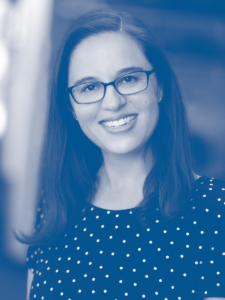The Berman Archive is committed to engaging with the broader Jewish professional community by preserving collections from a diversity of perspectives, and highlighting points of view from the mainstream and the margins of American Jewish life.
This month we interviewed Rella Kaplowitz, the Director of US Jewish Grantmaking at Charles and Lynn Schusterman Family Philanthropies. She helps to make sure the organization has the right information to gain insights to inform its work, and works with grantees and partners to enhance their capacity for data, metrics, strategy, performance and evaluation. In short, she speaks our language (research and documents).
Berman Archive: How would you describe your professional experience in the Jewish world?
Rella Kaplowitz: I am a Director of U.S. Jewish Grantmaking and I really like what I do – I get to sit at the intersection of strategy, data, practice and learning. Both at Schusterman and in the field of philanthropy, I get to help define and grow what it means to gather data and evidence and make strategic decisions based on that information. It’s a gift to work in service of the Jewish world.
I spent a good chunk of my career outside the Jewish community, and honestly never thought I’d return. Now I’ve been at the Charles and Lynn Schusterman Family Philanthropies for almost ten years, which feels wild to say!
I learned a lot and built skills that were not available in the Jewish world at that time. And so, getting to bring all that I learned home to my own community feels powerful. I see my work as contributing to Schusterman’s ability to invest in and strengthen Jewish life, which during this intense moment in Jewish history, feels even more important.
Berman Archive: Is working in the Jewish community important to you? Why?
Rella Kaplowitz: I find it personally and professionally fulfilling working in the Jewish community. I get to help unlock the power of learning in service of this greater goal of creating vibrant Jewish life and a vibrant future for the Jewish people. Plus, there are so many interesting challenges and puzzles to solve. Ask anyone and they’ll tell you I have an endless sense of curiosity and I’m not afraid to ask the hard questions—and after all, questioning and grappling with things we don’t yet understand are foundational to our Jewish tradition.
I see my work as contributing to Schusterman’s ability to invest in and strengthen Jewish life, which during this intense moment in Jewish history, feels even more important.
When I came back to working in the Jewish world, the Jewish nonprofit and philanthropic sectors were going through a shift, gaining a greater understanding of the importance of data and how it could drive strategic decision making. And one thing that I’ve been able to do both at Schusterman and in the philanthropic sector is respond to the growing desire for data and find ways to measure things that have felt tricky or amorphous. Together with amazing teammates and a deep understanding of our broader field and networks, we are continuing to explore how we can best collect data that helps us understand our impact while also benefiting our grantees and not creating undue burden.
Berman Archive: How has research been a part of your work?
Rella Kaplowitz: During my time in the philanthropic sector, I’ve seen research become essential to strategy and decision making. Two bright spots stand out. First, I’ve loved seeing how research has become a tool for lifting the field. Grantees and funders are continuing to make efforts to share what they are learning in real time, which helps us all achieve our goals.
Second, there’s been a major leap in the Jewish world when it comes to market research. Market research is about trying to surface what people think and feel and want so that we can better serve them and adapt what the Jewish community offers. Rather than focusing solely on their own constituents, organizations are also seeking to understand broader audiences, aspirational audiences. I’m proud to have played a part in expanding this practice in our sector.
Berman Archive: Jewish communal work tends to be so focused on the present and the future, what place does history have?
Rella Kaplowitz: Innovation is important—that’s how we make sure we stay relevant, especially when it comes to something religious or cultural. And yet, sometimes when we focus on the future, we can lose sight of what has worked, why it worked and how we can carry that forward. From a research perspective, it’s so important to document what works and why and to refer to those lessons.
Documenting what has been is also how we track change over time. History plays a really important role in thinking about how we build and collect baseline or comparison data and benefit from the longitudinal studies of our collective efforts.
At the same time, we must look to the future. To that end, one thing I wonder about is how we are shifting and will continue to shift to design for the future of our Jewish communities for Gen Z, Gen Alpha, and the generations that will come after them. As we saw with Millennials, who have been very heavily researched, there are so many new and different ways that people think about what it means to be Jewish. I think we are still working to develop a clear understanding of the breadth of what that might look like tomorrow.
Berman Archive: What are you focused on professionally as you head into 2024?
Rella Kaplowitz: We are reaching a tipping point when it comes to the abundance of data being collected through evaluation, research, and polling. It’s great to see how much our sector is relying on evidence to lead our work forward —that is something to celebrate! It’s also amazing to see how fast everyone is moving. And so, one thing that I’m focused on is exploring ways we can make sure our work is coordinated and collaborative while honoring the unique needs of the field and each organization.
And now that we are in the position of having so much data, questions that are top of mind for me are: What are we doing with our data? How can we use it to work smarter? How do we balance making information public (the Berman Archive is awesome for this!) while honoring the needs for confidentiality, too? How can we spark more shared learning?
I am excited to see where we go from here and how we build a culture around research agendas and learning questions. Field-wide learning that moves the Jewish community forward—that’s the dream!

